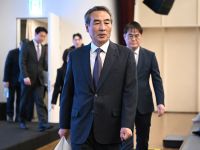Parsing Arab Spring offers second thoughts on the popular term

“Arab Spring,” the popular term used to describe the Arab uprisings of recent years, is more complicated and nuanced than is commonly believed, according to a study published by Northwestern University in Qatar. NU-Q professor of journalism Ibrahim Abusharif explored the range of perspectives around the phrase in Parsing Arab Spring, the first occasional paper – a paper that is part of a series contributing analysis to a debate - recently published by the university.
The uprisings in the Middle East since the winter of 2010-11 gathered easily under the term “Arab Spring.” But what is the impact of such a simplified title on public views of complicated socio-political events?
“It’s important to look at language, especially as it frames issues like what has been called Arab Spring,” Abusharif said. “This is especially true when the origin of a phrase is outside the region it describes.”
Based on a study analyzing more than 100 publications about the popular phrase that frames the uprisings in the Arab world, Parsing Arab Spring offers a careful and comprehensive look at how the term came to be—and to such wide acceptance. The publication looks at the historical roots of the term Arab Spring as well as descriptors used in Arabic press. It also explores how the spring descriptor came to be used by other regions going through political strife and why some circles have criticized the term.
“The linguistic and historical root of the word ‘spring’ is very European,” Abusharif explained. “Using this terminology to describe an event in the Arab world for the benefit of a Western audience can be seen as wishful thinking for a democratization movement. Language matters; it frames events because it influences how people think and perhaps what they do. Sometimes the framing is accurate and sometimes it’s questionable.”
“Dr. Abusharif’s work offers clear, academic insight on theories exploring the power of language in the context of mass, complex social and political movements,” said NU-Q Dean and CEO Everette E. Dennis. “This builds on an important line of journalistic study into public affairs and how public perception is influenced by the media.”
The paper, recently released in hard copy, is available free of charge through the NU-Q website at: http://bit.ly/1ihudQz
Background Information
Northwestern University in Qatar
We are educating the next generation of journalists, storytellers, and media professionals from our campus in Doha. As part of Northwestern University, one of the world’s premier research universities, we encourage the pursuit of knowledge across disciplines.







